───────────────
Psychotherapy: A Powerful Tool Against Depression - Paula Dagnino, Alberto Hurtado University [Santiago]
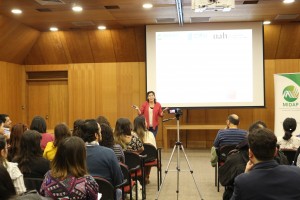 In the auditorium of the Parque Balmaceda Literary Café, the researcher presented the latest figures and research related to depression in our country, and how psychotherapy can be one of the most important tools in the treatment of this illness. With a large turnout, participants were able to share a cup of coffee and clear up some doubts. Paula Dagnino is a clinical psychologist from the Gabriela Mistral University and holds a Master's degree in Psychology from the Pontifical Catholic University of Chile. She earned a dual doctorate in Psychotherapy from the Pontifical Catholic University of Chile and the University of Heidelberg, Germany. She has worked as a psychotherapist both in private practice and as a member of the Adult Psychotherapy Unit of the Department of Psychiatry at the Catholic University. In the academic field, she has taught at the Catholic University and the Gabriela Mistral University. At the latter, she is in charge of the adult area of the Psychological Care Center, in addition to being head of the Clinical Area of the Faculty of Psychology at Alberto Hurtado University.
In the auditorium of the Parque Balmaceda Literary Café, the researcher presented the latest figures and research related to depression in our country, and how psychotherapy can be one of the most important tools in the treatment of this illness. With a large turnout, participants were able to share a cup of coffee and clear up some doubts. Paula Dagnino is a clinical psychologist from the Gabriela Mistral University and holds a Master's degree in Psychology from the Pontifical Catholic University of Chile. She earned a dual doctorate in Psychotherapy from the Pontifical Catholic University of Chile and the University of Heidelberg, Germany. She has worked as a psychotherapist both in private practice and as a member of the Adult Psychotherapy Unit of the Department of Psychiatry at the Catholic University. In the academic field, she has taught at the Catholic University and the Gabriela Mistral University. At the latter, she is in charge of the adult area of the Psychological Care Center, in addition to being head of the Clinical Area of the Faculty of Psychology at Alberto Hurtado University.
───────────────
University Mental Health - Juan Pablo Jiménez, University of Chile [Temuco]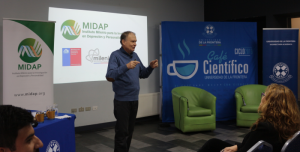 On Tuesday, October 15, the Second Conference of our Scientific Cafés on Mental Health began with the talk "University Mental Health" by our Director. Juan Pablo JiménezThis is also the first conference held in the regions, specifically in the city of Temuco, in cooperation with our host institution, the Universidad de la Frontera, fulfilling our commitment to decentralizing and democratizing knowledge. In the Aula Magna of the Universidad de la Frontera, Dr. Jiménez presented, among others, the results of his study "Depressive Symptoms and Psychological Well-being in Chilean University Students." This study found that 28% of Chilean university students (%) suffer from depressive symptoms, with greater depressive symptoms in women (32.2% of women) compared to 22.5% of men, although no differences were observed according to institution, age, or socioeconomic level. He also determined that 95.6% of affected university students are not receiving psychiatric treatment. The study included 720 male and female university students from the Metropolitan and Araucanía regions, with an average age of 20.
On Tuesday, October 15, the Second Conference of our Scientific Cafés on Mental Health began with the talk "University Mental Health" by our Director. Juan Pablo JiménezThis is also the first conference held in the regions, specifically in the city of Temuco, in cooperation with our host institution, the Universidad de la Frontera, fulfilling our commitment to decentralizing and democratizing knowledge. In the Aula Magna of the Universidad de la Frontera, Dr. Jiménez presented, among others, the results of his study "Depressive Symptoms and Psychological Well-being in Chilean University Students." This study found that 28% of Chilean university students (%) suffer from depressive symptoms, with greater depressive symptoms in women (32.2% of women) compared to 22.5% of men, although no differences were observed according to institution, age, or socioeconomic level. He also determined that 95.6% of affected university students are not receiving psychiatric treatment. The study included 720 male and female university students from the Metropolitan and Araucanía regions, with an average age of 20.
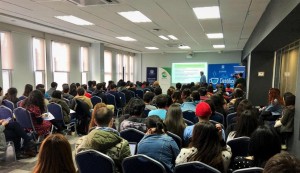 The figure suggests that university students experience substantially higher rates of depression than those found in the general population. In our country, the latest National Health Survey (2017) revealed that 15.81% of the national population presents symptoms, although a report from the Center for Studies on Conflict and Social Cohesion (COES) raises the rate to 18.31%. In this context, the study attempts to go beyond psychological difficulties and depression; it seeks to understand how positive aspects of mental health, such as psychological well-being, can protect against the risk of depression. Psychological well-being is a broad term that includes social, subjective, and psychological dimensions and relates to people's daily ability to cope with the challenges that arise in life.
The figure suggests that university students experience substantially higher rates of depression than those found in the general population. In our country, the latest National Health Survey (2017) revealed that 15.81% of the national population presents symptoms, although a report from the Center for Studies on Conflict and Social Cohesion (COES) raises the rate to 18.31%. In this context, the study attempts to go beyond psychological difficulties and depression; it seeks to understand how positive aspects of mental health, such as psychological well-being, can protect against the risk of depression. Psychological well-being is a broad term that includes social, subjective, and psychological dimensions and relates to people's daily ability to cope with the challenges that arise in life.
───────────────
The parents we had and the ones we want to be: How much do we influence our children's mental health? - Marcia Olhaberry, Catholic University of Chile [Valparaíso]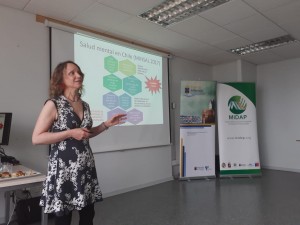 At 12 noon on Tuesday, October 19th, the first Scientific Café on Mental Health began in the port city of Valparaíso, in the Psychology Building, FACSO (Center for Mental Health and Social Development) of the University of Valparaíso. At this café, our research associate Marcia Olhaberry presented her talk "The Parents We Had and the Ones We Want to Be: How Much Do We Influence Our Children's Mental Health?", where the specialist reflected on the impact of parenting style on the development of children and young people, in addition to delving into concrete actions for dealing with young children during crisis situations. During the event, Javier Morán gave an introduction as a young researcher from MIDAP and a representative of our host university, the University of Valparaíso, with whom this Café was coordinated to decentralize knowledge to other locations in our country.
At 12 noon on Tuesday, October 19th, the first Scientific Café on Mental Health began in the port city of Valparaíso, in the Psychology Building, FACSO (Center for Mental Health and Social Development) of the University of Valparaíso. At this café, our research associate Marcia Olhaberry presented her talk "The Parents We Had and the Ones We Want to Be: How Much Do We Influence Our Children's Mental Health?", where the specialist reflected on the impact of parenting style on the development of children and young people, in addition to delving into concrete actions for dealing with young children during crisis situations. During the event, Javier Morán gave an introduction as a young researcher from MIDAP and a representative of our host university, the University of Valparaíso, with whom this Café was coordinated to decentralize knowledge to other locations in our country.
───────────────
[/fusion_text][/fusion_builder_column][/fusion_builder_row][/fusion_builder_container]Sixth season of "Scientific Cafés on Mental Health"
The 6th season of Scientific Cafés on Mental Health goes decentralized! 
MIDAP's Scientific Cafés in Santiago have become a traditional activity that garners interest and loyalty from the public. It is a citizen participation initiative that aims to create a space for conversation so that the general community can learn about various aspects of MIDAP's work in Depression and Personality, learn about specific mental health issues of mass interest, and raise awareness about mental health prevention, treatment, and promotion.
In 2019, in order to introduce new developments and, above all, respond to requests from the regional community, we organized this season in Santiago, Valparaíso, and Temuco, in the latter two cities in conjunction with two of our host universities: the University of Valparaíso (UV) and the University of La Frontera (UFRO). MIDAP researchers based in Santiago travel to these locations to showcase the latest research and applications on topics related to Depression and Personality, tailoring them to the needs and interests of these communities.
Each session is designed to be conducive to after-work conversations, so it begins at 6:00 PM with a welcome coffee for attendees. The session then begins with a talk, during which the researcher continually seeks interaction with the audience, concluding with an open discussion on the topic discussed.
All activities are free, but registration is required. Each talk is also video-recorded, so the recording is posted on our YouTube channel and available for those who were unable to attend.
Psychotherapy: A Powerful Tool Against Depression
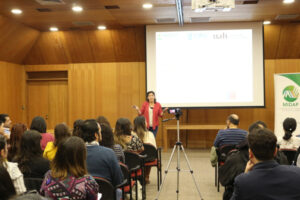 In the auditorium of the Parque Balmaceda Literary Café, the researcher presented the latest figures and research related to depression in our country, and how psychotherapy can be one of the most important tools in the treatment of this illness. With a large turnout, participants were able to share a cup of coffee and clear up some doubts.
In the auditorium of the Parque Balmaceda Literary Café, the researcher presented the latest figures and research related to depression in our country, and how psychotherapy can be one of the most important tools in the treatment of this illness. With a large turnout, participants were able to share a cup of coffee and clear up some doubts.
Paula Dagnino is a clinical psychologist from the Gabriela Mistral University and holds a Master's degree in Psychology from the Pontifical Catholic University of Chile. She earned a dual PhD in Psychotherapy from the Pontifical Catholic University of Chile and the University of Heidelberg, Germany. She has worked as a psychotherapist both in private practice and as a member of the Adult Psychotherapy Unit of the Department of Psychiatry at the Catholic University. In academia, she has taught at the Catholic University and the Gabriela Mistral University. At the latter, she is in charge of the adult department of the Psychological Care Center and head of the Clinical Department of the Faculty of Psychology at the Alberto Hurtado University.
MIDAP's Scientific Cafés in Santiago have become a traditional activity that garners interest and loyalty from the public. It is a citizen participation initiative that aims to create a space for conversation so that the general community can learn about various aspects of MIDAP's work in Depression and Personality, learn about specific mental health issues of mass interest, and raise awareness about mental health prevention, treatment, and promotion.
In 2019, in order to introduce new developments and, above all, respond to requests from the regional community, we organized this season in Santiago, Valparaíso, and Temuco, in the latter two cities in conjunction with two of our host universities: the University of Valparaíso (UV) and the University of La Frontera (UFRO). MIDAP researchers based in Santiago travel to these locations to showcase the latest research and applications on topics related to Depression and Personality, tailoring them to the needs and interests of these communities.
Each session is designed to be conducive to after-work conversations, so it begins at 6:00 PM with a welcome coffee for attendees. The session then begins with a talk, during which the researcher continually seeks interaction with the audience, concluding with an open discussion on the topic discussed.
All activities are free, but registration is required. Each talk is also video-recorded, so the recording is posted on our YouTube channel and available for those who were unable to attend.